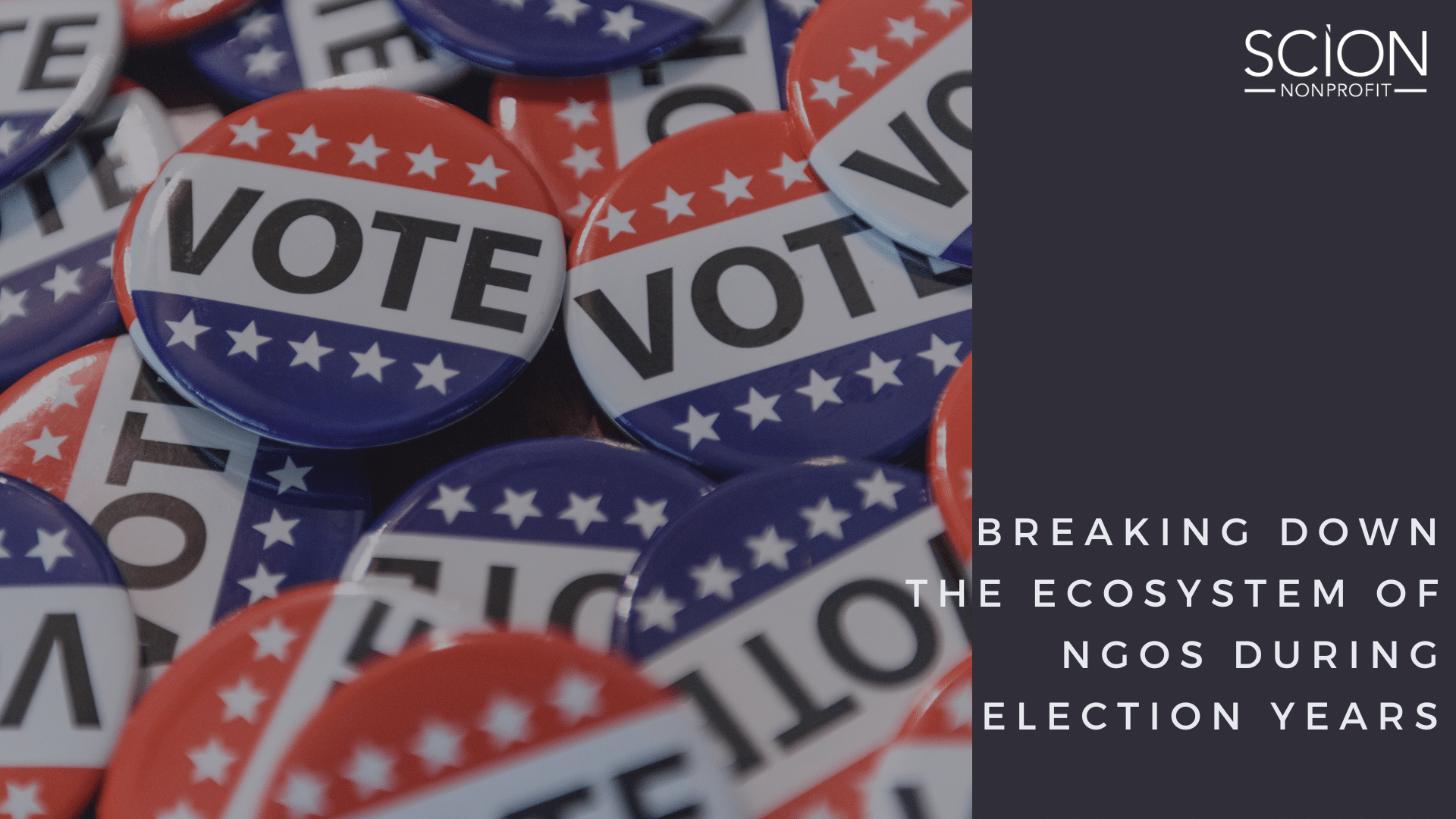
25 Sep Breaking Down the Ecosystem of NGOs During Election Years
Election years in the United States bring about a whirlwind of activity, not just in the political arena but also within the ecosystem of Non-Governmental Organizations (NGOs). These non-governmental organizations play a pivotal role in shaping the democratic landscape, influencing policies, and mobilizing communities. For anyone involved in nonprofit leadership, charitable giving, or nonprofit fundraising, understanding the unique operations, challenges, and strategies of NGOs during election years is crucial.
This comprehensive article covers various aspects of NGOs during election years, such as their definition, role, challenges, fundraising strategies, and how they can improve their ecosystem. It also highlights how Scion Nonprofit Staffing can support these organizations by providing top-tier talent to bolster their efforts during these critical times.
What is an NGO?
An NGO, or non-governmental organization, is a nonprofit group that operates independently of any government. NGOs focus on addressing social, environmental, and political issues, often working to fill gaps that government and private sectors can’t sufficiently address.
The Different Types of NGOs
Humanitarian
Humanitarian NGOs focus on emergency relief, disaster response, and providing essential services during crises. Organizations like the Red Cross and Doctors Without Borders are prime examples, delivering critical aid and medical care in conflict zones and disaster-stricken areas.
Environmental
Environmental NGOs work towards conservation, sustainability, and environmental protection. Groups such as Greenpeace and the Sierra Club advocate for policies to combat climate change, preserve natural habitats, and promote sustainable practices.
Advocacy
Advocacy NGOs aim to influence public policy and legislation to bring about social change. These organizations, like Amnesty International and the American Civil Liberties Union (ACLU), often engage in lobbying, public campaigns, and legal actions to promote human rights, civil liberties, and social justice.
Importance of NGOs in Society
NGOs are vital in bridging the gap between the government and the public. They provide essential services, advocate for policy changes, and raise awareness on critical issues. They often operate in areas where the government is unable or unwilling to reach, making them indispensable in addressing societal challenges.
The Role of NGOs During Election Years
Policy Advocacy
NGOs work tirelessly to influence policy decisions by lobbying for legislation that aligns with their mission. For instance, human rights organizations advocate for the protection of civil liberties, while environmental organizations push for laws to combat climate change. These efforts ensure that critical issues are brought to the forefront during election campaigns.
Voter Education and Mobilization
One of the essential roles of NGOs during election years is educating voters on the impact of voting. They provide information on candidates’ platforms, highlight important issues, and explain the voting process. Additionally, these organizations can mobilize communities by encouraging voter registration and participation, which is crucial for a healthy democracy.
Monitoring Elections
To ensure fair and transparent elections, NGOs deploy observers to monitor the electoral process. These observers watch over polling stations, report irregularities, and help maintain the integrity of the election. Their presence deters fraud and supports a free and fair electoral process.
Examples and Case Studies
NGOs have significantly influenced numerous election campaigns. For instance, during the 2020 US elections, various NGOs were instrumental in conducting voter education campaigns, organizing voter registration drives, and monitoring polling stations. These efforts played a crucial role in ensuring a high voter turnout and maintaining the integrity of the electoral process.
Challenges Faced by NGOs During Election Years
NGOs often face a wide range of challenges during election years. From political pressures to the impact of disinformation, these organizations can struggle during elections in the modern era. In this section, we’ll take a look at some of the biggest challenges that these organizations face during election years.
- Political Pressure and Interference: NGOs often face political pressure and interference, which can hinder their operations. Governments and political entities may attempt to influence an NGO’s activities, restrict their funding, or undermine their credibility.
- Funding Constraints: Election years can lead to significant shifts in donor priorities. With increased contributions to political campaigns, NGOs may experience funding constraints. This can impact their ability to carry out programs and services effectively.
- Public Skepticism and Trust Issues: Maintaining public trust is crucial for these organizations, especially during election years. They must navigate public skepticism and avoid perceptions of partisanship to retain their credibility and support. With so much disinformation around elections and NGOs, it’s necessary to keep public trust for the organization at its highest.
- Navigating Legal and Regulatory Frameworks: Election laws and regulations are complex and vary by jurisdiction. NGOs must ensure compliance with these legal frameworks to avoid any legal issues and maintain their operations.
- Media Scrutiny and Misinformation: NGOs are often subject to intense media scrutiny during election years, especially with the rise of misinformation and harmful content on social media platforms. They must manage their public image carefully and counter misinformation and other false content that could damage their reputation.
- Balancing Neutrality with Advocacy: While advocating for their causes, NGOs must maintain a non-partisan stance. This balancing act can be challenging, especially in politically charged environments.
- Collaboration with Political Entities: Collaborating with political entities requires careful navigation to avoid bias and maintain neutrality. NGOs must build alliances that support their mission without compromising their non-partisan stance.
- Security and Safety Concerns for Staff and Volunteers: Increased harmful practices like cyber and physical threats require NGOs to implement robust security measures to protect their staff, volunteers, and sensitive data.
Planning Fundraising During Election Years
Election years present unique challenges and opportunities for NGOs when it comes to fundraising. With donor attention often diverted towards political campaigns, they must employ strategic planning to ensure they meet their financial goals. Effective fundraising during these periods requires diversifying funding sources, engaging donors early, leveraging technology, and crafting compelling narratives. Below, we explore various strategies that can help NGOs navigate the complexities of election-year fundraising and maintain a steady flow of resources.
Diversifying Funding Sources
- Grants: Applying for grants from foundations, government agencies, and international organizations can provide a steady stream of financial resources.
- Individual Donations: Engaging individual donors early and building relationships can help secure consistent contributions. Personalizing donor communication and demonstrating impact are critical strategies.
- Corporate Sponsorships: Forming partnerships with corporations can bring in significant resources. These partnerships can include monetary donations, in-kind contributions, and volunteer support.
- Utilizing Technology for Fundraising: Digital tools and online platforms are essential for modern fundraising. NGOs can leverage social media, crowdfunding platforms, and email campaigns to reach a broader audience and engage donors effectively.
- Effective Communication and Marketing Strategies: Crafting compelling narratives that highlight the impact of donations is crucial. NGOs should use various marketing strategies, including storytelling, partnering with influential actors who share their same passion and beliefs, testimonials, and visuals, to connect with donors emotionally and inspire contributions.
Improving the NGO Ecosystem During Elections
Election years can be both a challenging and transformative period for NGOs. While the heightened focus on political campaigns may present obstacles, it also creates opportunities to fortify their operations and ecosystem. By fostering strong networks and alliances, investing in staff training, emphasizing transparency, and utilizing data-driven strategies, NGOs can enhance their effectiveness and resilience. The following section outlines how these organizations can navigate the complexities of election seasons, ensuring they remain impactful and adaptable amidst changing circumstances.
Building Strong Networks and Alliances
Collaborating with other organizations, community groups, and stakeholders can amplify an NGO’s efforts. Strong networks and alliances provide support, share resources, and enhance collective impact.
Enhancing Transparency and Accountability
Maintaining transparency and accountability builds trust with stakeholders. NGOs should regularly communicate their activities, financials, and outcomes to demonstrate their integrity and effectiveness.
Investing in Staff Training and Development
Equipping staff with the skills and knowledge to navigate election complexities is essential. Training programs focused on election laws, advocacy strategies, and crisis management can enhance staff capabilities.
Leveraging Data and Analytics for Decision-Making
Data-driven decision-making allows NGOs to optimize their strategies and measure impact. Leveraging data and analytics can provide insights into donor behavior, program effectiveness, and areas for improvement.
Promoting Civic Education and Engagement
Educating and engaging the public in civic activities strengthens democracy. NGOs should promote civic education initiatives that encourage informed and active participation in the electoral process.
Scion Nonprofit can Help You Improve Your NGO Ecosystem!
At Scion Nonprofit, we understand the unique challenges NGOs face during election years. Our recruitment services are designed to help you build a strong fundraising and development team, capable of navigating the complexities of the political landscape. With a diverse talent pool and a deep understanding of the nonprofit sector, we are committed to helping your organization achieve its goals.
Our nonprofit recruitment services specialize in fields like:
- Talent Acquisition
- Staff Augmentation
- Nonprofit Executive Search
- Nonprofit Sector Expertise
By partnering with us, you can focus on your mission while we take care of building and maintaining a high-performing team. Our team is here to support your organization every step of the way, ensuring you have the talent and resources needed to thrive. Get in touch with us today to find out how we can aid your mission!
About the Author
Patrick Chiotti (he/him) is an accomplished SEO writer and is currently the Marketing and Communications Specialist at Scion Staffing, bringing years of experience in SEO knowledge and a passion for writing to the Scion team. With additional experience in customer service roles, retail, and accounting, Patrick brings a unique set of knowledge and skills to his role while sharing the passion to continue learning about a wide range of topics so he can share his voice to a larger audience. Outside of Scion, Patrick spends his time as a football coach at the high school level and is passionate about teaching the game, while remaining a student to it. He is also a husband and father, and enjoys fitness, as well as a passion for cooking amazing food.




